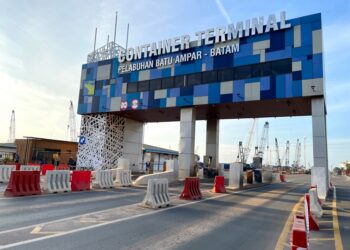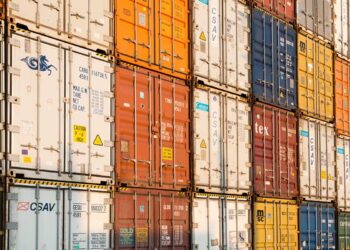Contract negotiations between West Coast dock workers and their employers have appeared to hit a boiling point, leaving recycled material in need of export stuck in ports – and potentially bound for landfills.
Since May 2014, the International Longshore and Warehouse Union (ILWU) and the Pacific Maritime Association (PMA) have been attempting to reach a long-term contract. Those negotiations continued into late October, and at that point ILWU “began to stage devastating slowdowns up and down the coast,” PMA alleges. The dispute has caused major delays in overseas cargo shipments, including those carrying recycled materials.
Scott Horne, vice president of government affairs at the Institute of Scrap Recycling Industries (ISRI), told Resource Recycling the dispute is hurting recycling-related business that are already battling a tough economic climate.
“With falling commodity prices, recyclers are already having a tough enough time,” Horne said. “The ports slowdown is now an additional obstacle to markets that do exist. Scrap is the top export by volume out of the ports of Los Angeles and Long Beach, and roughly $9.4 billion in scrap passes out of West Coast ports every year. A complete shutdown would have a crippling effect on the industry and cost American jobs.”
Meanwhile, the West Coast Refuse and Recycling Coalition, representing California, Oregon and Washington recycling businesses and waste haulers, sent out a letter to members Jan. 30 urging action and noting the potential negative impacts of a prolonged dispute.
“The continued slowdown at West Coast port terminals is having serious implications upon our industry’s ability to fulfill our contractual obligations designed to achieve maximum recycling and waste diversion goals for the municipalities we serve,” the coalition wrote. “Without immediate relief, we may soon be forced to begin redirecting this material to extended storage and disposal, undermining the very goal of our material management operations.”
In addition, San Francisco’s KTVU News recently reported waste and recycling company Recology is quickly amassing stocks of cardboard and paper awaiting export to Asian paper mills. The California Refuse Recycling Council has also sent a letter to California Gov. Jerry Brown, urging action on the dispute.
Far West Recycling president Keith Ristau told Resource Recycling the Oregon-based company was sitting on 7,200 tons of material “all due to the slowdown.”
In the latest development on negotiations, PMA suspended vessel operations over the weekend, stating in a press release that “PMA member companies finally have concluded that they will no longer continue to pay workers premium pay for diminished productivity.” Ports were reopened Monday but no agreement between the two sides has been reached.
PMA announced Feb. 4 a new contract offer to ILWU “goes as far as we believe we can go.” According to an accompanying video message from PMA president Jim McKenna, the offer raises the annual average salary of full-time ILWU workers to more than $160,000 (from $147,000) and raises the maximum pension to nearly $89,000 (from $80,000). The five-year offer also continues to provide health insurance at no cost to ILWU employees.
“I hope the ILWU leadership will give very serious consideration to this contract offer, which I believe respects their members and gives us a clear path to conclude these talks,” McKenna said during a conference call with reporters last week. “We owe it to workers and businesses across the nation to resolve our differences and get our ports moving again.”
ILWU president Robert McEllrath, meanwhile, issued a strongly worded retort to McKenna’s characterization that the port could be headed for collapse, and he called on workers to “stay at the negotiating table and work through a few remaining issues,” McEllrath said. “We are very close to reaching an agreement.”
Craig Merrilees, ILWU’s communications director, told Resource Recycling on Friday that “only a few outstanding issues remain” and stated the two parties “are very, very close” to an agreement.
While Merrilees would not divulge specific issues in need of resolution before an agreement can be met, he said they can be “easily resolved.” He added, “We just need to get it done.”




























